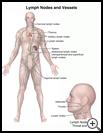
Retroperitoneal Lymph Node Biopsy
________________________________________________________________________
KEY POINTS
- A retroperitoneal lymph node biopsy is a procedure for removing small pieces of tissue from lymph nodes in your lower belly.
- This procedure is done to check for cancer.
- Ask your provider how long it will take to recover and how to take care of yourself at home.
- Make sure you know what symptoms or problems you should watch for and what to do if you have them.
________________________________________________________________________
What is retroperitoneal lymph node biopsy?
A retroperitoneal lymph node biopsy is a procedure for removing small pieces of tissue from the lymph nodes in your lower belly for lab tests.
When is it used?
Your healthcare provider may suspect that you have cancer in your retroperitoneal lymph nodes. Lymph nodes are small, bean-shaped glands. They are part of the lymph system and can be found in groups or just one by itself. The lymph system is part of your body's system for fighting infection. The lymph system consists of lymph nodes that store blood cells (lymphocytes) to fight infection and vessels that carry fluid, nutrients, and wastes between your body and your bloodstream. They may also trap cancer cells. However, they can also develop a cancer called lymphoma.
How do I prepare for this procedure?
- Plan for your care and find someone to give you a ride home after the procedure.
- You may or may not need to take your regular medicines the day of the procedure. Tell your healthcare provider about all medicines and supplements that you take. Some products may increase your risk of side effects. Ask your healthcare provider if you need to avoid taking any medicine or supplements before the procedure.
- Tell your healthcare provider if you have any food, medicine, or other allergies such as latex.
- Follow any other instructions your healthcare provider gives you.
- Ask any questions you have before the procedure. You should understand what your healthcare provider is going to do. You have the right to make decisions about your healthcare and to give permission for any tests or procedures.
What happens during this procedure?
You will be given a local anesthetic to numb the area. Your provider will use a CT, MRI, or ultrasound scan to help guide a thin needle to the enlarged lymph node. Your provider will remove a small piece of tissue from the lymph nodes for testing.
What happens after this procedure?
You will be in recovery for up to 6 hours to make sure that there is no bleeding. Avoid strenuous activity for the rest of the day.
Ask your healthcare provider:
- How and when you will get your test results
- How long it will take to recover
- If there are activities you should avoid and when you can return to your normal activities
- How to take care of yourself at home
- What symptoms or problems you should watch for and what to do if you have them
Make sure you know when you should come back for a checkup. Keep all appointments for provider visits or tests.
What are the risks with this procedure?
Your healthcare provider will explain the procedure and any risks. Some possible risks include:
- Anesthesia has some risks. Discuss these risks with your healthcare provider.
- You may have infection or bleeding.
- The needle may puncture a nearby blood vessel, an organ, or a gland. This could cause it to leak or bleed.
- If the needle crosses a collection of bacteria, it could spread an infection to other areas or to the bloodstream.
Every procedure or treatment has risks. Ask your healthcare provider how these risks apply to you. Be sure to discuss any other questions or concerns that you may have.

